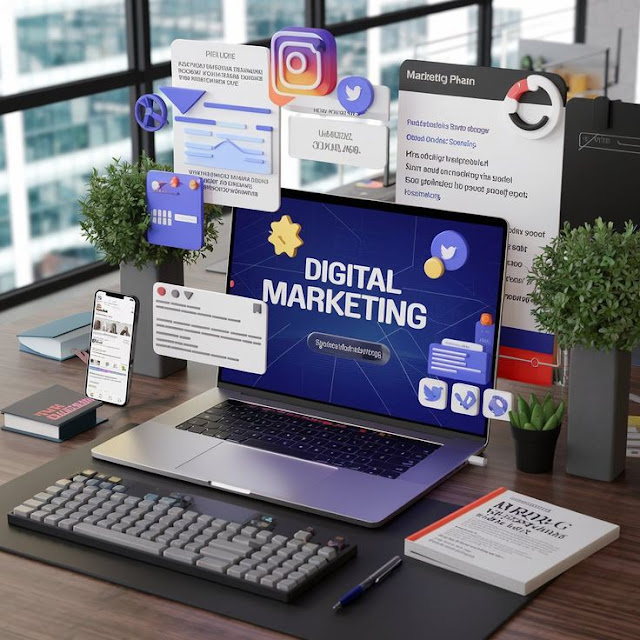How Does Digital Marketing Work?
In today’s rapidly evolving digital landscape, businesses need to harness the power of digital marketing to remain competitive. But how exactly does digital marketing work? This article will break down the core processes, strategies, and benefits of digital marketing, providing actionable insights for businesses looking to thrive in the online world.
What Is Digital Marketing?
Digital marketing refers to the use of online platforms and digital tools to promote products or services. Unlike traditional marketing, which relies on print ads, billboards, or TV commercials, digital marketing leverages channels such as search engines, social media, email, and websites to reach a broader, targeted audience.
It works by combining data-driven strategies, creative content, and analytical tools to attract and retain customers.
Why Is Digital Marketing Crucial?
Digital marketing offers unique advantages over traditional marketing:
1. Precise Audience Targeting: Reach the right people based on demographics, interests, and online behavior.
2. Cost Efficiency: Digital campaigns are generally more affordable than traditional advertising methods.
3. Measurable Results: Analyze performance in real time to optimize campaigns.
4. Global Reach: Access customers worldwide without the constraints of physical location.
Core Components of Digital Marketing
To understand how digital marketing works, let’s explore its essential components:
1. Search Engine Optimization (SEO)
SEO is the foundation of digital marketing. It involves optimizing your website to rank higher on search engine results pages (SERPs). This increases organic traffic and visibility.
Key elements of SEO include:
Keyword Research: Identifying terms your audience is searching for.
On-Page Optimization: Improving content, meta tags, and headers.
Technical SEO: Ensuring your site loads quickly and is mobile-friendly.
Link Building: Earning backlinks from reputable sites.
2. Content Marketing
Content marketing focuses on creating valuable, relevant, and engaging content to attract and retain an audience. This includes:
Blog posts
Videos
Infographics
eBooks
Content marketing not only informs but also builds trust and authority for your brand.
3. Social Media Marketing
Social media platforms like Facebook, Instagram, LinkedIn, and Twitter allow businesses to connect directly with their audience. Social media marketing includes:
Running paid ads
Sharing engaging posts
Building a community
It’s an excellent way to humanize your brand and boost engagement.
4. Pay-Per-Click Advertising (PPC)
PPC campaigns, such as Google Ads, allow businesses to bid for ad placements on search engines or social media platforms. This ensures immediate visibility and helps drive traffic to your site.
5. Email Marketing
Email marketing is a powerful tool for nurturing leads and retaining customers. Personalized emails can include product recommendations, discounts, and informative content, fostering long-term relationships.
6. Analytics and Data
Digital marketing thrives on data. Tools like Google Analytics, Facebook Insights, and email campaign trackers help businesses understand customer behavior and measure campaign effectiveness.
How Digital Marketing Collects and Uses Data
Digital marketing allows businesses to collect data in ways that offline methods cannot. This data is more precise, specific, and actionable.
Imagine you offer financial services and want to send special offers to users who have previously viewed your products online. Through digital marketing, you can:
1. Track User Behavior: Tools like cookies and pixels track how users interact with your website.
2. Segment Audiences: Divide your audience based on demographics, interests, or purchase history.
3. Personalize Content: Deliver tailored messages and offers based on user behavior.
This targeted approach ensures that your marketing efforts are more effective and generate a higher return on investment (ROI).
Real-World Example of Digital Marketing
Let’s say you’re a financial services provider. Using digital marketing, you can:
Run Google Ads to appear when users search for terms like “best financial advisor near me.”
Use social media ads to target people interested in financial planning.
Leverage email marketing to send personalized investment tips to your subscribers.
Publish SEO-optimized blog posts that answer common financial questions, driving organic traffic to your site.
By combining these strategies, you create a seamless customer journey that builds trust and drives conversions.
Benefits of Digital Marketing
1. Better Customer Insights: Access data that reveals customer preferences, helping you make informed decisions.
2. Improved ROI: Targeted campaigns ensure that every dollar spent is effective.
3. Enhanced Engagement: Interact with customers in real time through social media and chatbots.
4. Scalability: Digital campaigns can easily grow as your business expands.
Tools and Platforms for Digital Marketing
Here are some essential tools to streamline your digital marketing efforts:
Google Analytics: For tracking website performance.
SEMrush: For SEO and competitive analysis.
Mailchimp: For email marketing campaigns.
Canva: For creating visually appealing content.
Hootsuite: For managing social media accounts.
Recommended Resource
To master digital marketing strategies, I recommend Digital Marketer for expert advice and resources to grow your business.
I recommend Digital Marketer
How to Start Your Digital Marketing Journey
1. Define Your Goals: Understand what you want to achieve—brand awareness, leads, or sales.
2. Identify Your Audience: Know who you’re targeting and what their pain points are.
3. Choose the Right Channels: Focus on platforms that align with your audience’s preferences.
4. Monitor and Optimize: Use analytics to refine your campaigns continuously.
Conclusion
Digital marketing is a powerful tool that helps businesses reach their audience, understand their needs, and deliver value. By leveraging SEO, content marketing, social media, and data analytics, you can create campaigns that drive real results.
Whether you’re a small business owner or a large enterprise, understanding how digital marketing works is key to staying ahead in today’s com
petitive market. Start your journey today and watch your business grow.
For expert guidance and strategies, check out Digital Marketer—I highly recommend them for actionable tips and insights.

No comments:
Post a Comment